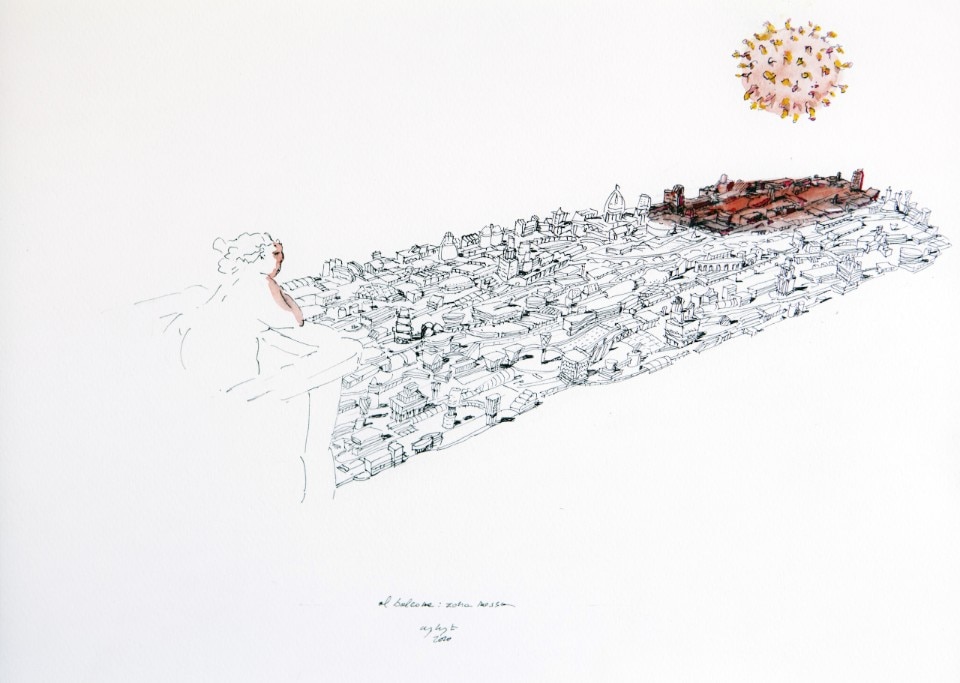This article was originally published in Domus 1052, December 2020.
Domus 1041 was titled Milan Italy. It portrayed Milan as the emblem of Italy moving at speed, the vanguard of a country confidently reacting to the crises of recent decades, once again rethinking itself with innovative models of development. That was in December 2019, but it feels like much more than a year ago, with the pandemic ravaging all reasonable certainty about possible ways forward.
Throughout 2020 Domus has been reflecting on the effects of a crisis that can unquestionably be defined as epochal. By its vastness and drama, it has revealed the limits of a form of development where the rationale of financial dynamics has sidelined respect for the environment or any effective policy for mitigating the inequality recorded on all maps of planetary geography. Behind the euphoria of the markets, the nature of the Emperor’s new clothes is becoming clear. From David Quammen’s prophecies about the senselessness of our vision of the environment to Thomas Piketty’s analyses of ideological capitalism, we have been brutally confronted with the shortcomings of ways of life that were widely denounced but equally widely shrugged off. The upshot is that the pandemic that is destroying our economic, social and psychological fabric appears to have fallen on us more like a misfortune than the result of mindless individual and collective choices.
Scientists warn that the virus may be contained and controlled, but perhaps never really eradicated. It is bound to remain among us with the deterrent effect of a danger. This will induce us to stay constantly alert, but also heighten our feeling of purposeful hope, the only weapon that has let humanity cope with catastrophes throughout its history, adapting to the environment and establishing a new balance. If science remains the most effective tool for overcoming a kind of doomsday hysteria, our awareness of being in the world should guide a series of actions dictated by rationality and a renewed perception that we belong to a global system whose parameters need to be radically reset.
For example, the industrial paradigm might be replaced with the ecological paradigm urged by scholars of plant neurobiology when they point to the strain exerted by an anthropocentrism that sees everything different from us as wrongheaded, defective or even a stumbling block.
Yet, as the most reliable research teaches us, the plant world is a reminder of the need to think no longer in terms of the individual, but of communities. The Internet of Plants (Suzanne Simard’s Wood Wide Web) is not just a brilliant journalistic metaphor. It is an appeal to rediscover the long duration at a time when we have become accustomed to thinking only in terms of the stress of speed.
Inland Italy, that string of small towns that form the vertebrae of a territorial system that has its backbone in the country’s landforms, points the way to an inevitable rethinking to be faced with determined awareness of its complexity, as Franco Arminio explains with reassuring realism.
There are no immediate solutions, but we can take care of the ordinary. Architects should beware of the temptation (often passed off as utopia) to take shortcuts that are only a Pavlovian reflex before the unknown. We need utopias of behaviours and everyday practices, not sensational gestures resolved into images or facile slogans.
In our view, we need to start from the observation that – as we learn from history ‒ we will continue to live as always but hopefully better. The pandemic has led us to revalue what we took for granted by casting us into the depression of an involuntary aesthetic of quarantine: a cruel parody of the fundamentals of architecture as the art of spaces and the design of coexistence. Wherever we look, we see devastating signs of erasure, from social-distancing markers on the ground to masks that deny identities. Can architecture, which has always rested on the construction of sociability and sharing, pursue the chimeras of habitats designed on the surge of fear and suspicion?
More than ever, instead, we feel the need to look to the future by focusing on the multiplication of space and not its mortification. The spontaneous movements in our cities – on balconies and terraces, in parks and on the water – during the months of lockdown testify to a need for sociality that can only take the form of a new-found community. We are grateful to Ugo La Pietra for epitomising it poetically in his image on the cover.
This issue of Domus presents a reflection on the shortcomings of Italy’s urban and territorial structure, which the emergency has simply highlighted with dramatic clarity. Many of the achievements we describe predate the pandemic, and these success stories are actually the result of prescient choices. The lesson we can learn from such virtuous practices – which have been constructed slowly via rational and visionary initiatives – is that design is our only emergency exit. Changing, reversing failed approaches and innovating are the crucial measures for coping with the risk of the future. And of course also art, which has always been Italy’s most precious asset, supporting the tradition of an integral humanism that has spread across its regions, its environmental heritage and its museums with the widespread presence of an idea of beauty as a necessary form of redemption.
“We are at war, let’s talk about art,” wrote Gio Ponti in the darkest years of the war from which republican Italy emerged. Was this the utopia of a poet in the face of the rubble of immense devastation? No, it was again a form of realism: the conviction that nothing can be built on fear. But it can on art.
Opening image: Ugo La Pietra, Al balcone, a sketch from Storie di virus. Published by Corraini in August 2020, the book is a written and illustrated diary of thoughts and drawings produced by La Pietra during this year’s spring lockdown. © Ugo La Pietra. All rights reserved Maurizio Corraini srl




